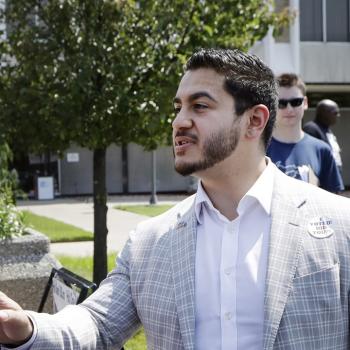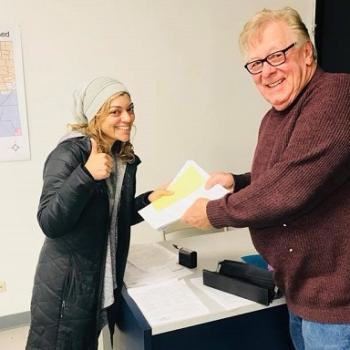 |
|
How did I get here?
|
If you’ve frequented Islamic websites and blogs over the past year, especially those geared towards youth, you may have come across links to videos of a close cropped young American Muslim speaking feverishly and comically into a webcam about the anomalies and quirks of Muslim life in the West. More accurately, if you haven’t seen the young man in question, it would be something of a minor miracle. Since mid-2006, Californian Baba Ali has produced a series of 7-10 minute video clips of himself, edited in rapid fire soundbites, produced in association with a like-minded group of young Muslim filmmakers calling themselves Ummah Films. Skirting fine lines between (near) preachiness, offbeat humour, self-deprecation, and sincere earnestness, Ali’s “The Reminder” series of videos has struck a chord with countless Muslim youth around the world facing the same questions he poses regarding marriage, extremism, and the norms of Islamic behaviour – in addition to his own anecdotes (such as the story of his converting to Islam). In the space of a year, he has arguably become the Muslim world’s first bonafide Internet celebrity (erm, besides that Mahir guy and scary people with knives). Normally, producing video weblogs – or vlogs – would be seen as inconsequential in the age of the millions of contributions to MySpace and YouTube (even more so when some of the more popular ones turn out to be frauds). And for many over 30 or non-native English speakers, Ali’s hyperkinetic delivery and youth-oriented message might struggle to make an impression. But to paraphrase an Elvis record, millions of fans (the ones who have viewed his collective episodes so far over two “seasons”) can’t be wrong. A recent visit by Ali to the UK resulted in overflowing and sold out crowds at University College London, where he was treated like a rock star. His videos have been translated into a host of different languages, including Russian, French, Indonesian, German, and Dutch. Ali finds himself at a loss to explain his sudden popularity, but is keen to make the best of it, especially for the kids – his “weakness.” altmuslim’s Zahed Amanullah recently spoke to Ali, who told us about his stand-up comedy attempt, e-mail conversions, and why politics are part of the problem.
![]() You’ve struck quite a nerve with Muslim youth all over the world over the past year with your video weblogs. Did you ever conceive of being this influential?
You’ve struck quite a nerve with Muslim youth all over the world over the past year with your video weblogs. Did you ever conceive of being this influential?
Baba Ali: I never expected this, I never planned for this, and I never even thought that this was even possible. Especially with something as simple as sitting in front of a camera, pressing a little button, and not doing anything special other than talking, especially because the users have been spoken to so much in lectures and different talks.
I’m not a scholar. I don’t think I’m qualified to give people fatwas or anything like that. I’m not going to pretend to be a scholar. I just try to tell people simple things in a nice way, inshallah, and at the end of the day when you think about it, that’s what seems to work when friends advise you to do certain things.
I don’t know how to explain it. When people have told me why they’ve been impacted by it they don’t feel like they’re being threatened or they don’t feel like they’re being lectured. It’s almost like a friend giving advice in a nice way. So I think that’s why they’ve been able to take it in. Alhamdulillah, it seems to be working!
![]() But how did this all start?
But how did this all start?
This whole thing started out as an accident. It wasn’t something that I was planning out. It was just something I was doing for friends. And then one friend told another friend. The next thing you know, you have millions of people watching. I’m still in shock to this day that all these people watch these little videos.
![]() You mentioned just now that you’re not a scholar. Have people criticised you for that, thinking that you may be pretending to be a scholar?
You mentioned just now that you’re not a scholar. Have people criticised you for that, thinking that you may be pretending to be a scholar?
A lot of times I get comments with a “His beard isn’t long enough, so why are we listening to him?” type of thing.
![]() Really?
Really?
Yeah. Indirect messages like that. It shows you the level the ummah is thinking and unfortunately it doesn’t matter how long your beard is, it’s just to take advice. I’m not saying I’m right and everyone is wrong or vice versa. I’m just giving advice. Once we put our fingers in our ear and say we’re not listening to anyone unless they look like this, then that’s really low level thinking. But that’s a very small percentage, less than 1% of the people that are watching.
I’m actually really, really surprised at the number of non-Muslims who give a positive response. I thought that after the whole 9/11 thing, because there’d be so many people that have negative thinking of Islam, that all I’d get was negative response from non-Muslims. That hasn’t been true at all.
![]() One of the things that strikes me about watching what you do – because, as you know, anyone could get in front of a webcam and spout off whatever they want to – is that you have a really great comedic sensibility. Have you ever thought of doing something like stand up comedy?
One of the things that strikes me about watching what you do – because, as you know, anyone could get in front of a webcam and spout off whatever they want to – is that you have a really great comedic sensibility. Have you ever thought of doing something like stand up comedy?
(Laughs) I get told that over and over again. And I said, “Ok, you know what? I’ll try it one time.” One day, I went and tried stand up comedy. It was the day of the [midterm] November elections here in the States where there was a 50% turnout here in California. So when I went to do standup, there was no one in the audience. The only thing that’s worse than no one laughing is if there’s no one in the audience! So there was a few comics, and they’re not even paying attention. And the MC is distracted and I’m just sitting there talking to myself. So it was pretty bad. After that, I said “I’m not doing stand up comedy anymore!”
But here’s the problem with stand up comedy which became challenging for me – and this is why I say I’m not a comedian – comics will make up stories to make people laugh. They’ll say “One time I went here and I did this,” when they never did that. People know they never did that. But I thought to myself after reading the hadith of the Prophet (SAW) that even the Prophet (SAW) made jokes, but he never lied in his jokes. So if I want to do anything, especially if I’m doing it for Islamic reasons, I can’t use haram means to do something halal.
That’s why I say I’m not a comedian. What you see is what you get. This is Ali being Ali. My friends who hang out with me, they don’t even watch these videos. I have family members who are not into it because they know me already. This is nothing special. This is not an act or anything. And those that meet me at conferences and spend a weekend with me say, “Dude, you’re exactly the way you are in your videos!” Yeah, that’s how I am.
![]() One of the things I noticed in all the topics you cover – you cover a lot of social issues, a lot of Islamic issues – you haven’t really gone into politics like Palestine or the war in Iraq. Is there any reason for that?
One of the things I noticed in all the topics you cover – you cover a lot of social issues, a lot of Islamic issues – you haven’t really gone into politics like Palestine or the war in Iraq. Is there any reason for that?
These things are symptoms of our problem. Today it’s Palestine, before it was Kashmir, then it was Kosovo. Before that it was Bosnia. The list goes on and on. Today it’s Iraq, yesterday it was Afghanistan. It goes on and on and on. These are symptoms to our problem. At the end of the day, we have to go back to what the core problem is. And that’s us following Islam.
Common sense [is] where generally human beings say if the door’s locked, stop trying to open it because it’s not going to open the second time you try to turn the knob. It’s locked. It’s common sense. Once it’s locked, it’s locked unless you have the key to open it.
We as Muslims need to go back to something called “Islamic sense” – a term I came up with. I think that’s where we’re lacking. We need to start from the very basics dealing with some issues. For some of my critics who say “Dude, talk about politics…” …first of all, there’s enough people talking about that. Who’s talking about extravagant weddings? Who’s talking about these culture vs. Islam issues? Who’s talking about, not just the importance of hijab – which you will hear about, since many sisters talk about those subjects – but who’s talking about the girls who aren’t wearing hijab properly at Islamic conferences? Nobody!
And there’s reasons why they can’t talk about it. And I understand it. I can’t talk about it right here in my circle of friends because it’s, one, politically incorrect. Two, you’ll be considered an outcast because they’ll say “Who are you to judge us?” But when a random guy off the internet tells you something, you can’t take it personally. That’s what it comes down to. He’s telling me exactly what I’m doing, and now it’s between me and Allah (SWT) to change or continue doing things the way I’m doing. That’s what it comes down to.
![]() I noticed in the hijab episode you did – which you acknowledged might be controversial – in the comments on your site, even people who disagreed with you liked what you did.
I noticed in the hijab episode you did – which you acknowledged might be controversial – in the comments on your site, even people who disagreed with you liked what you did.
Alhamdulillah. People often ask, “What’s your inspiration for all this?” Some people are surprised because they’re expecting me to say some comedian or something. And actually I tell them the Prophet (SAW). They look puzzled when I answer that question that way. I tell them the reason why is that the Prophet (SAW) dealt with different people in different ways. And he would give them dawah in such a way that it’s not offensive, but in a smart way which impacted them. He understood how they thought.
For example, with the old lady who left trash in front of his house, he was patient with her. And with the great wrestler of that time, the Prophet (SAW) wrestled him three times because that’s what [he] knew – he knew wrestling. He didn’t say “Ok, let me go wrestle the old lady. I’ll show her!” (Laughs). He knew how to deal with different people differently.
When you look at the situation today, the youth are on the internet. They’re watching videos. Practicing or non-practicing Muslims will send you an interesting video, you’ll send it to someone else saying “Check this out.” That was my idea. If I can do something interesting enough, then inshallah, hopefully everyone else will get the message. Alhamdulillah, from a few thousand people, it became a few million. And this has been in less than a year.
![]() You’re affilliated with a group of individuals who are filmmakers in Ummah Films. Are you working on anything else with them to build on the audience that you have?
You’re affilliated with a group of individuals who are filmmakers in Ummah Films. Are you working on anything else with them to build on the audience that you have?
Well, this is a common misconception. There is no Ummah Films group of people. Originally, Ummah Films started out as a group of people and I tried to get people together to make films. This is how the whole Reminder series started. Each person was supposed to specialise in one thing. One guy would go learn directing, one guy would learn editing, another guy would learn how to write scripts. My job was to be the editor (though) I tried to do writing as well.
I wrote my first script and I gave it to a bunch of brothers and asked them if they could make a film out of it so I could practice my editing. One month project became two months. Two months became three months. This was only a five minute video, by the way! After three months, I felt I was forgetting the stuff I was supposed to practice and learn. So I turned on my own camera to try to make something to edit. At the same time, I wanted to so something funny. And then I thought if I’m going to spend this much time editing, at least make it beneficial. I thought, let me talk about the stuff I see at jumah all the time – it was a Friday that I started. And the funny things at jumah, that was the pilot.
![]() Are you going to continue, inshallah, the Reminder series? Could we expect more from you, perhaps?
Are you going to continue, inshallah, the Reminder series? Could we expect more from you, perhaps?
Yeah, as long as I have topics to come up with or there are things that impact me, I will do it, inshallah. The common requests I get on e-mails and in the comments sections are “Do a video about this, do a video about that.” I can’t! I’m not a writer… I wish I was! To me it’s like writing a diary or a journal – a video journal. I can’t just make up a day if it didn’t exist. Even the hijab one was about me going to Islamic conferences. It’s not about telling people how to wear hijab properly.
There are now people in Ummah Films who are trying to work on other projects. But the entire Reminder series, I’m stuck doing it by myself. I write it, I edit it, I produce it.
![]() As an American Muslim, are people from around the world who see you curious about someone like you who speaks about Islam with such conviction and so influentially?
As an American Muslim, are people from around the world who see you curious about someone like you who speaks about Islam with such conviction and so influentially?
Well, it’s not that they don’t let us practice [here], but it has become more difficult after 9/11 because of the misconceptions. Trials and tribulations make Muslims [into] non-Muslims and non-Muslims [into] Muslims. After 9/11, so many [non-Muslims] became Muslim and many Muslims became non-Muslim. It changed on both sides. To me, I’m really amazed when I get those e-mails saying “I just became Muslim from your videos.”
![]() Really?
Really?
Yeah, one participant in the London event came there to announce that she watched the videos and became Muslim. I was in shock! I get e-mails out there, but it didn’t impact me as it did when a sister came live in front of the audience [to announce it]. Because my videos aren’t made for non-Muslims. I’m talking about issues that Muslims go through. There’s so many scholars and so many speakers that release dawah CDs or DVDs of lectures explaining the basics of Islam to people. But how many people are talking about the issues we go through? And not just overall issues, but issues that no one wants to talk about.
![]() Being honest about things.
Being honest about things.
Exactly. You know sometimes there’s politics involved. Forget the politics outside on the news. What about [politics in] the masjid? Say there’s a fundraiser coming up to build a masjid. And a lot of the people who have money deal with riba. And the khatib that’s going to be speaking that week wants to talk about riba and why it’s haram. People in the masjid are like “Wait a second. Couldn’t we do that khutba next week after the fundraiser’s over because you may scare off these people? They don’t want to talk about it.
![]() You make a really good point. Honesty influences people more than giving a good face to everything. People want to see that Muslims are honest about their lives and that influences people better than just pretending everything is perfect.
You make a really good point. Honesty influences people more than giving a good face to everything. People want to see that Muslims are honest about their lives and that influences people better than just pretending everything is perfect.
Yeah. At the end of the day, that’s what it comes down to, bro. I want to make sure that the topics that are being pushed under the rug… someone brings it up. Because people aren’t bringing it up. If they were, I wouldn’t have to talk about it. I’m not talking about how to do wudu because you’ll hear that 101 times.
I went to one place – it was amazing – one brother said “Our imam at the masjid I go to is trying to beat the other imam at how fast we can finish the Quran [during Ramadan]. So we recite so fast that by the time we finish the Quran, we’re all going to drive to the other masjid to finish the Quran with them too just to prove to them how fast we are.”
What’s the point? Even if you do a super-speed tarawih, you still have people outside complaining. I’m like “Where are you guys the rest of the year?” Suddenly tarawih became the most important prayer in the world. During the fard prayers there’s the normal number of people there, even during Ramadan, but during tarawih it’s filled. You would think this is the sunnah and this is the fard, not vice versa.
It’s amazing. It’s more of a cultural thing than an Islamic thing.
![]() Anything else? You were mentioning before we started that you had an interview [today] with a Saudi classroom…
Anything else? You were mentioning before we started that you had an interview [today] with a Saudi classroom…
I do things like that which are, I guess, a little bit a break from the norm. The classroom from Saudi Arabia asked if I could sit down [with] the kids who have come across the videos. The teachers thought it would be kind of cool if [I] came on a videoconference and give some advice to the kids. So I said I’ll try that. A lot of times I’m invited to certain places and I say no because of my schedule. But sometimes it’s hard to say no when the invitation is sweet and the kid stuff, usually, is my weakness.
I’ve been a kid in school, in high school, and college – I grew up here and that’s why I think I can relate to a lot of the stuff youth go through. I remember when I was in elementary school, we used to have these assemblies [where] some guy will come and talk and sometimes you’ll have a really cool speaker. In an Islamic school in Northern California next week, they have an assembly and instead of announcing a speaker [they’re] going to surprise people and just bring [me] down.
That’s actually kind of cool. My audience [will be] 8 year olds to 14 year olds. Most people would say “Oh, I need 5,000 people, I need my entourage.” Me? I’ll sleep in the masjid, I don’t care.
Zahed Amanullah is associate editor of altmuslim.com. He is based in London, England.











